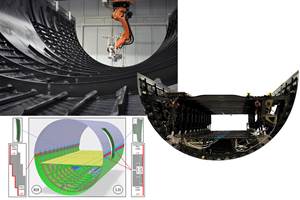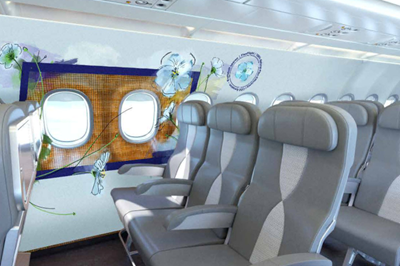Fully recyclable sandwich panel targets aerospace cabin interiors
CAMX 2024: Diab introduces sandwich panels that combine its structural foam core Divinycell F and thermoplastic skins, designed to meet current challenges in sustainability, REACH compliancy and more.
Share
Diab (DeSoto, Texas, U.S. and Laholm Sweden) has developed a new recyclable 100% thermoplastic sandwich panel for aerospace cabin interiors. The thermoplastic sandwich is designed to be a solution to current challenges such as sustainability, REACH compliance and a circular economy.
The solution combines the advantages of Diab’s structural foam core Divinycell F and thermoplastic skins. The materials used have been tested and qualified by aerospace OEMs, and are fully compliant with all industry requirements.
Diab’s sandwich panels for aerospace cabin interiors are made with a custom manufacturing process, including the skins,core bonds and shaping. This can also include decorative skins. Cabin interior panels are produced in a single-step process that yields 30-80% higher mechanical properties and fire resistance behavior than current honeycomb core and phenolic resin solutions, according to the company. The process also decreases weight by up to 10%, reduces production cycle time and reduces production costs by 20%.

Thermoplastic sandwich panels.
Divinycell F is a 100% thermoplastic Divinycell F core material that is already REACH-compliant. It is said to be recyclable and has a zero-waste production process. A sandwich core for commercial aircraft interiors, it is FST-compliant, has low sensitivity to water absorption, optimizes surface finish and reduces labor times. Another focus is its sustainability, which it offers through use of a recycled core.
Diab says it has demonstrated the recyclability of the panel with a process consisting in grinding the panel, then extruding recycled pellets and finally injection molding into 3D parts. Other recycling scenarios are said to be possible.
Related Content
-
Thermoplastic composites: Cracking the horizontal body panel nut
Versatile sandwich panel technology solves decades-long exterior automotive challenge.
-
MFFD longitudinal seams welded, world's largest CFRTP fuselage successfully completed
Fraunhofer IFAM and partners have completed left and right welds connecting the upper and lower fuselage halves and sent the 8×4-meter full-scale section to ZAL for integration with a cabin crown module and testing.
-
Combining multifunctional thermoplastic composites, additive manufacturing for next-gen airframe structures
The DOMMINIO project combines AFP with 3D printed gyroid cores, embedded SHM sensors and smart materials for induction-driven disassembly of parts at end of life.
Related Content
Thermoplastic composites: Cracking the horizontal body panel nut
Versatile sandwich panel technology solves decades-long exterior automotive challenge.
Read MoreMFFD longitudinal seams welded, world's largest CFRTP fuselage successfully completed
Fraunhofer IFAM and partners have completed left and right welds connecting the upper and lower fuselage halves and sent the 8×4-meter full-scale section to ZAL for integration with a cabin crown module and testing.
Read MoreCombining multifunctional thermoplastic composites, additive manufacturing for next-gen airframe structures
The DOMMINIO project combines AFP with 3D printed gyroid cores, embedded SHM sensors and smart materials for induction-driven disassembly of parts at end of life.
Read MoreManufacturing the MFFD thermoplastic composite fuselage
Demonstrator’s upper, lower shells and assembly prove materials and new processes for lighter, cheaper and more sustainable high-rate future aircraft.
Read MoreRead Next
Diab reduces carbon footprint by 46%
Between 2016 and 2021, the sandwich composite solutions company made alterations in material, reduced waste and efficient use of waste, production and energy sources to drive its reduction efforts.
Read MoreLufthansa Technik, Diab develop greener composites for interior cabin components
Aeroflax flax fiber-based prepreg and one-step thermoplastic manufacturing process for 100% recyclable panels production pioneer lighter weight, reduce CO2 emissions.
Read MoreAssembling the Multifunctional Fuselage Demonstrator: The final welds
Building the all-thermoplastic composite fuselage demonstrator comes to an end with continuous ultrasonic welding of the RH longitudinal fuselage joint and resistance welding for coupling of the fuselage frames across the upper and lower halves.
Read More










